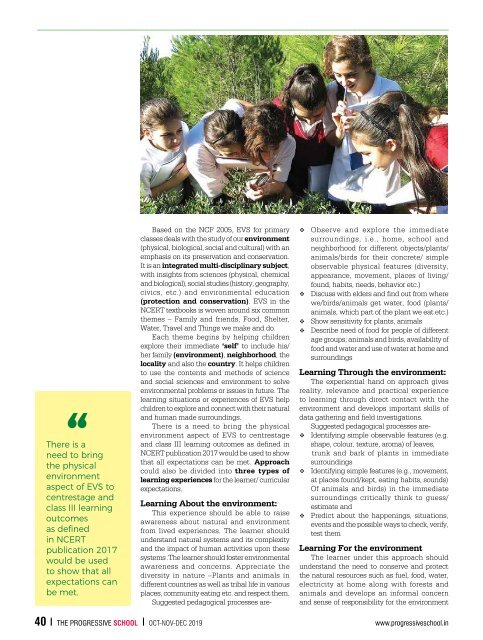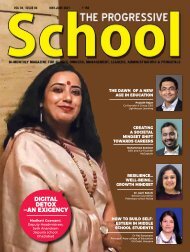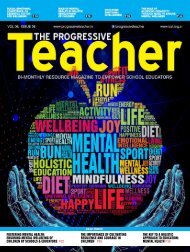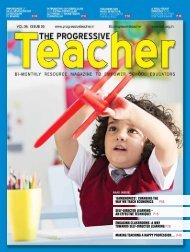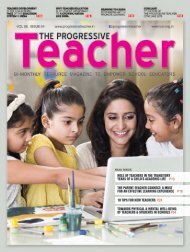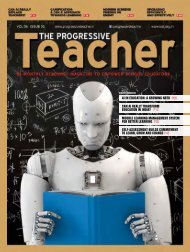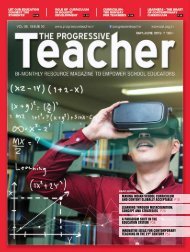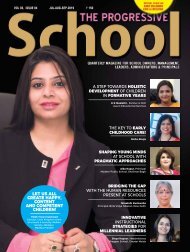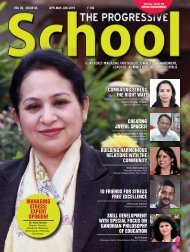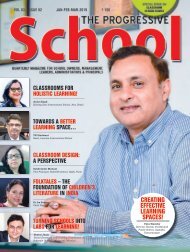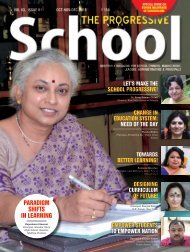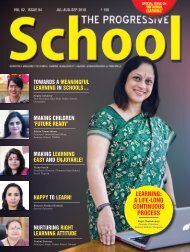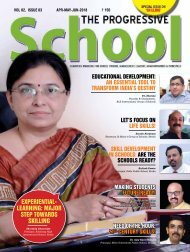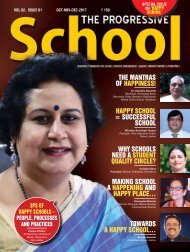The Progressive School Vol 04 Issue 01
This issue of The Progressive School brings attention to the impact of Artificial Intelligence in School Education. The articles featured in the magazine are written by eminent school leaders, principals and owners for their contemporaries.
This issue of The Progressive School brings attention to the impact of Artificial Intelligence in School Education. The articles featured in the magazine are written by eminent school leaders, principals and owners for their contemporaries.
Create successful ePaper yourself
Turn your PDF publications into a flip-book with our unique Google optimized e-Paper software.
<strong>The</strong>re is a<br />
need to bring<br />
the physical<br />
environment<br />
aspect of EVS to<br />
centrestage and<br />
class III learning<br />
outcomes<br />
as defined<br />
in NCERT<br />
publication 2<strong>01</strong>7<br />
would be used<br />
to show that all<br />
expectations can<br />
be met.<br />
Based on the NCF 2005, EVS for primary<br />
classes deals with the study of our environment<br />
(physical, biological, social and cultural) with an<br />
emphasis on its preservation and conservation.<br />
It is an integrated multi-disciplinary subject,<br />
with insights from sciences (physical, chemical<br />
and biological), social studies (history, geography,<br />
civics, etc.) and environmental education<br />
(protection and conservation). EVS in the<br />
NCERT textbooks is woven around six common<br />
themes – Family and friends, Food, Shelter,<br />
Water, Travel and Things we make and do.<br />
Each theme begins by helping children<br />
explore their immediate ‘self’ to include his/<br />
her family (environment), neighborhood, the<br />
locality and also the country. It helps children<br />
to use the contents and methods of science<br />
and social sciences and environment to solve<br />
environmental problems or issues in future. <strong>The</strong><br />
learning situations or experiences of EVS help<br />
children to explore and connect with their natural<br />
and human made surroundings.<br />
<strong>The</strong>re is a need to bring the physical<br />
environment aspect of EVS to centrestage<br />
and class III learning outcomes as defined in<br />
NCERT publication 2<strong>01</strong>7 would be used to show<br />
that all expectations can be met. Approach<br />
could also be divided into three types of<br />
learning experiences for the learner/ curricular<br />
expectations.<br />
Learning About the environment:<br />
This experience should be able to raise<br />
awareness about natural and environment<br />
from lived experiences. <strong>The</strong> learner should<br />
understand natural systems and its complexity<br />
and the impact of human activities upon these<br />
systems .<strong>The</strong> learner should foster environmental<br />
awareness and concerns. Appreciate the<br />
diversity in nature –Plants and animals in<br />
different countries as well as tribal life in various<br />
places, community eating etc. and respect them.<br />
Suggested pedagogical processes arev<br />
Observe and explore the immediate<br />
surroundings, i.e., home, school and<br />
neighborhood for different objects/plants/<br />
animals/birds for their concrete/ simple<br />
observable physical features (diversity,<br />
appearance, movement, places of living/<br />
found, habits, needs, behavior etc.)<br />
v Discuss with elders and find out from where<br />
we/birds/animals get water, food (plants/<br />
animals, which part of the plant we eat etc.)<br />
v Show sensitivity for plants, animals<br />
v Describe need of food for people of different<br />
age groups; animals and birds, availability of<br />
food and water and use of water at home and<br />
surroundings<br />
Learning Through the environment:<br />
<strong>The</strong> experiential hand on approach gives<br />
reality, relevance and practical experience<br />
to learning through direct contact with the<br />
environment and develops important skills of<br />
data gathering and field investigations.<br />
Suggested pedagogical processes arev<br />
Identifying simple observable features (e.g.<br />
shape, colour, texture, aroma) of leaves,<br />
trunk and bark of plants in immediate<br />
surroundings<br />
v Identifying simple features (e.g., movement,<br />
at places found/kept, eating habits, sounds)<br />
Of animals and birds) in the immediate<br />
surroundings critically think to guess/<br />
estimate and<br />
v Predict about the happenings, situations,<br />
events and the possible ways to check, verify,<br />
test them<br />
Learning For the environment<br />
<strong>The</strong> learner under this approach should<br />
understand the need to conserve and protect<br />
the natural resources such as fuel, food, water,<br />
electricity at home along with forests and<br />
animals and develops an informal concern<br />
and sense of responsibility for the environment<br />
40 THE PROGRESSIVE SCHOOL oct-nov-dec 2<strong>01</strong>9<br />
www.progressiveschool.in


